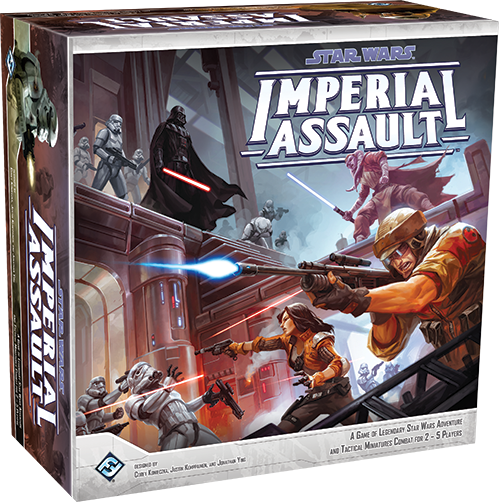
The Assault Begins
Preview Movement and Combat in Imperial Assault

“Bring em on, I’d prefer a straight fight to all this sneaking around.”
–Han Solo, Star Wars: A New Hope
Take your place in the Star Wars saga with Imperial Assault, a board game of tactical combat and adventure for two to five players! Every game of Imperial Assault brings you directly into the action of the classic films, whether you infiltrate secret Imperial bases as Rebel operatives, or use your squads of Stormtroopers and mercenaries to quell the insignificant Rebellion.
As we explored previously, two complete games are included within Imperial Assault. In the campaign game, up to four players control heroes of the Rebellion, engaging in a series of thrilling, cinematic missions. Opposite these heroes, one player controls the unlimited resources and power of the Galactic Empire, fielding massive AT-ST walkers, deadly Stormtroopers, mechanical Probe Droids, and more.
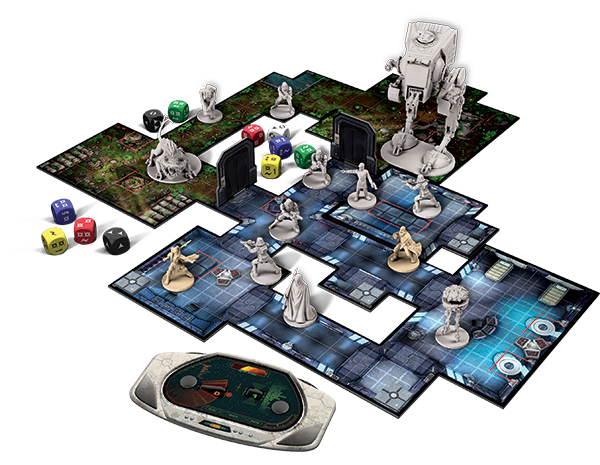
Both the campaign game and the skirmish game, as well as the various units for both sides, will be explored in more detail in later previews. Today, we’ll explore how your units in both the campaign game and the skirmish game race between objectives, interact with the mission, and battle your opponent!
Make Your Move
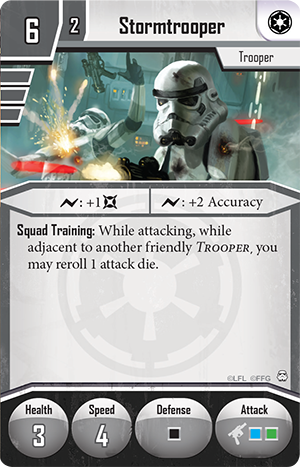 In any game of Imperial Assault, you and your opponent alternate activating a figure or group of figures. Each time a figure is activated, it receives two actions to move across the battlefield, attack enemies at range or in melee, interact with objects in the mission, or rest from the strain of battle. Most actions can be used twice in a single activation, but only heroes in a campaign have the ability to attack twice in one activation.
In any game of Imperial Assault, you and your opponent alternate activating a figure or group of figures. Each time a figure is activated, it receives two actions to move across the battlefield, attack enemies at range or in melee, interact with objects in the mission, or rest from the strain of battle. Most actions can be used twice in a single activation, but only heroes in a campaign have the ability to attack twice in one activation.
As you lead your Rebel strike team or Imperial squads through a mission, you’ll quickly learn the necessity of movement. Any figure can use a move action to gain movement points equal to the speed listed on the figure’s hero sheet or Deployment card. Each movement point allows your figure to move one space in any direction, and what’s more, you can spend these points at any time during the figure’s activation. This means you can interrupt your figure’s movement with another action, allowing you to fire your blaster before diving for cover, or open a door and keep running.
For example, the Imperial player chooses to activate a group of Stormtroopers, and starts the activation by choosing a single Stormtrooper. He begins by taking a move action, which gives the chosen Stormtrooper four movement points. He moves the Stormtrooper one space, then uses his second action to open the adjacent door, removing it from the map. Finally, he continues using the movement points his Stormtrooper gained with its first action, moving three more spaces.
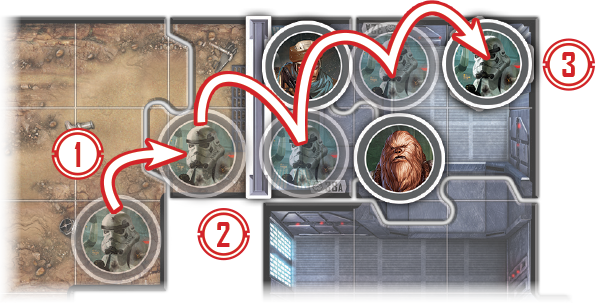
The Stormtrooper uses a move action to gain four movement points (1), moves one space and opens the door with his second action (2), and spends his remaining three movement points (3).
Although movement is usually straightforward, you’re sure to encounter a wide range of terrain in your missions. Every mission in Imperial Assault is constructed out of a series of double-sided, interlocking map tiles that depict a wide range of Star Wars environments. You might venture into a dusty Tatooine cantina, explore a Corellian factory, or battle deadly creatures through the dense jungles of Yavin 4. Wherever you find yourself in the galaxy, the terrain around you is sure to have a potent effect on how you move through a mission. You may need to go out well of your way to avoid difficult or impassible terrain.
Fire When Ready!
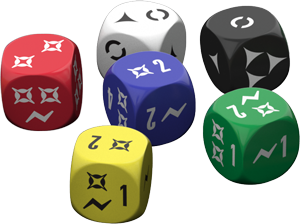 Although movement brings you to your objectives, you still need a way to handle your opponents. Whether you’re rescuing captured prisoners or escaping from the clutches of Darth Vader, you’ll quickly find yourself battling those who stand between you and your objective.
Although movement brings you to your objectives, you still need a way to handle your opponents. Whether you’re rescuing captured prisoners or escaping from the clutches of Darth Vader, you’ll quickly find yourself battling those who stand between you and your objective.
Combat in Imperial Assault is resolved by rolling a number of combat dice. During an attack, both you and your target roll combat dice to determine how much damage is dealt to your opponent. On the combat die, the number of ![]() (damage) rolled determines how much damage may be dealt to the target of your attack. One damage is prevented by each
(damage) rolled determines how much damage may be dealt to the target of your attack. One damage is prevented by each ![]() (block) rolled on the defender’s dice.
(block) rolled on the defender’s dice.
In addition to damage, the attacker may generate ![]() (surge) when he attacks. These symbols are used to trigger special combat abilities, allowing you to deal more damage, pierce armor, recover health, and other powerful effects. A surge can be cancelled by an
(surge) when he attacks. These symbols are used to trigger special combat abilities, allowing you to deal more damage, pierce armor, recover health, and other powerful effects. A surge can be cancelled by an ![]() (evade), reducing the attacker’s ability to trigger his special combat abilities. The final die symbol is the
(evade), reducing the attacker’s ability to trigger his special combat abilities. The final die symbol is the ![]() (dodge). This symbol only appears on one face of one defense die, but if it is rolled, the defender dodges the attack and sustains no damage!
(dodge). This symbol only appears on one face of one defense die, but if it is rolled, the defender dodges the attack and sustains no damage!
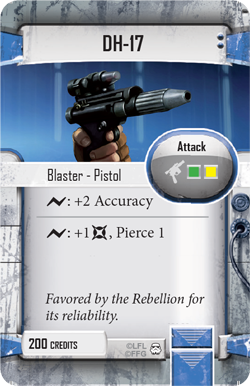
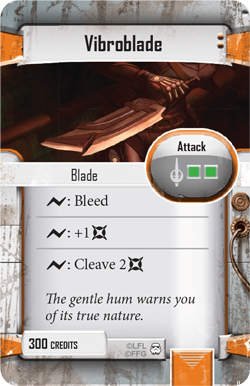
There are two different types of attack that can occur in Imperial Assault. Some figures are armed with melee weapons, only threatening units directly adjacent to them. Others are equipped with powerful blasters and slugthrowers that can fire across rooms at any figure within your line of sight. When making a ranged attack, however, you must ensure that you roll enough accuracy for the attack to hit your target. Many combat dice bear a number alongside the symbols – the total of the numbers shown on your attack dice represents your attack’s accuracy. If your target is seven squares away from you on the battlefield, you must roll a total of at least seven accuracy for your attack to hit. Otherwise, the attack misses and your target takes no damage.
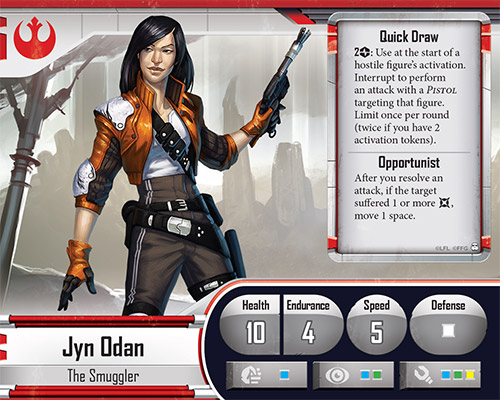
As an example of an attack, a Stormtrooper figure decides to fire at Jyn Odan, who is six spaces away from him. The Imperial player checks that his Stormtrooper has line of sight to Jyn Odan, then both players roll their combat dice at the same time. The Imperial player rolls a blue die and a green die on attack, as shown on the Stormtrooper’s Deployment card, while the Rebel player controlling Jyn Odan rolls a white die, corresponding to the die shown as Jyn Odan’s defense on her hero sheet.
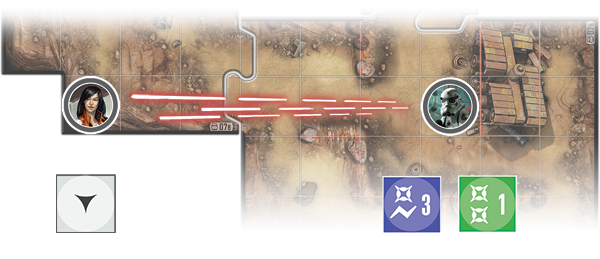
Both players receive the results shown above: the Stormtrooper has rolled four accuracy, three damage and one surge, whereas Jyn Odan has rolled one block. Ordinarily, the Stormtrooper’s attack would miss, because he needs at least six accuracy to hit Jyn. However, the Imperial player can spend the surge to trigger a surge ability shown on the Stormtrooper’s Deployment card. He triggers an ability that grants the attack two additional accuracy, bringing the total to six accuracy – a hit! One of the three damage rolled is prevented by the single block, and Jyn takes two damage from the Stormtrooper’s attack.
Take Command
Although moving and fighting are the main focus of your Imperial Assault missions, you’ll find that other actions have plenty to offer. Interacting with objects allows you to open doors, investigate crates, or pick up objects crucial to your mission. If you stand next to a door and take an action to interact with it, the door is opened and removed from the map. No figure can close a door voluntarily, although some game effects may force a door to close.
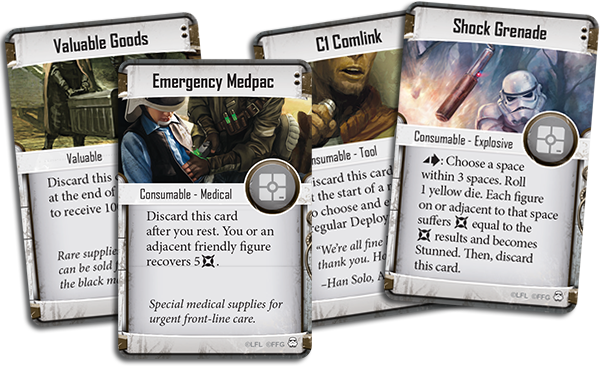
Your campaign missions are also sprinkled with a variety of supply crates. By interacting with a crate, a hero can claim its token and draw a card from the Supply deck. These cards offer a host of helpful items for the heroes during a campaign, ranging from grenades to bacta infusions. What’s more, investigating crates grants you additional credits after the mission ends, giving you more buying power for new items and gear, as we’ll discuss in a later preview.
Battle for the Fate of the Galaxy
The fate of the galaxy rests in your hands with the intense ground battles of Imperial Assault. Whether you complete missions on the orders of Rebel High Command or serve the power of the Galactic Empire, you’ll find Star Wars adventure in Imperial Assault.
Check back for more in-depth previews of both the campaign game and the skirmish game in Imperial Assault, and join us next time as we take our first look at the new heroes of the Rebellion included in this game.
…
